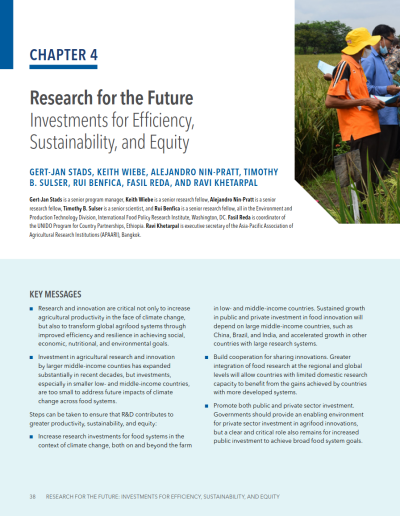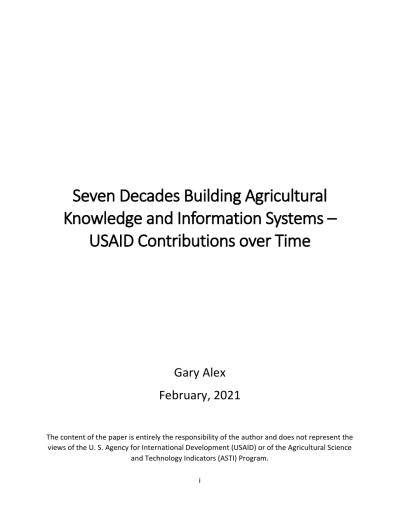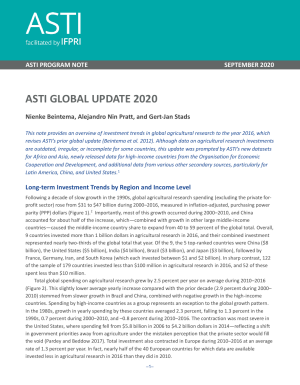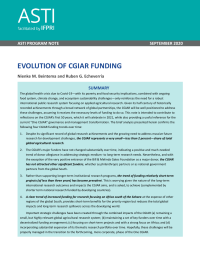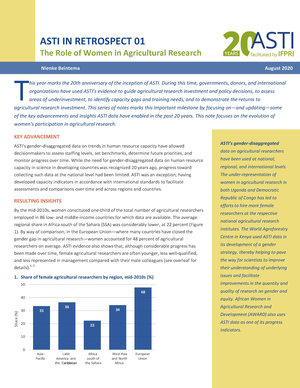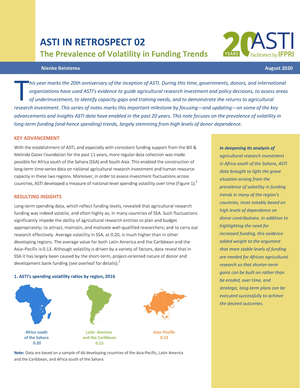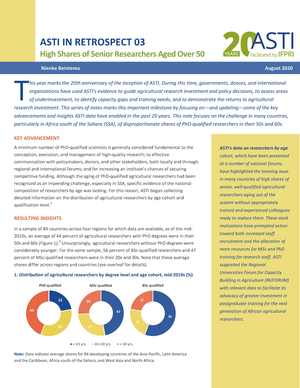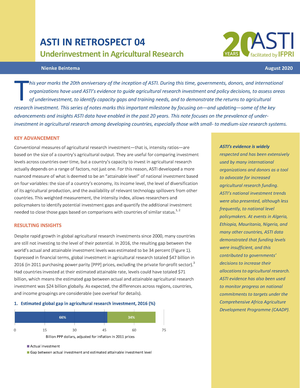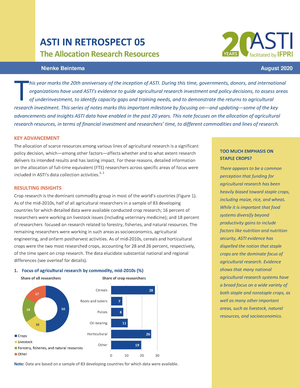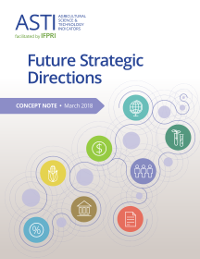Authors:
Gert-Jan Stads, Keith Wiebe, Alejandro Nin-Pratt, Timothy B. Sulser, Rui Benfica, Fasil Reda, and Ravi Khetarpal
Year:
2022
Publisher
International Food Policy Research Institute (IFPRI)
Further information
Back to:
Research and innovation are critical not only to increase agricultural productivity in the face of climate change, but also to transform global agrifood systems through improved efficiency and resilience in achieving social, economic, nutritional, and environmental goals.
Investment in agricultural research and innovation by larger middle-income counties has expanded substantially in recent decades, but investments, especially in smaller low- and middle-income countries, are too small to address future impacts of climate change across food systems.
This review complements a data set of estimates of USAID funding for agricultural research, extension, and education over the period 1950 to 2017. For most of this period, agriculture was a priority investment area for USAID as a means of preventing famine, spurring economic growth, reducing rural poverty, promoting political stability, and conserving natural resources. Agricultural research, extension, and education together came to be considered the core of the agricultural knowledge and information systems (AKIS), key to innovation necessary to increase production and productivity.
Authors:
Nienke Beintema, Alejandro Nin Pratt, and Gert-Jan Stads
Year:
2020
Publisher
International Food Policy Research Institute (IFPRI)
Back to:
After a decade of sluggish growth in the 1990s, global agricultural research spending grew by 50 percent during 2000–2016, mostly driven by China and other large middle-income countries. Concurrently, spending in high- income countries stalled, ending the period with negative growth, while global investments by the private-for profit sector doubled. These trends caused the middle-income country share of total global investments to increase from 40 to 58 percent during the 2000–2016 period.
Authors:
Nienke M. Beintema and Ruben G. Echeverría
Year:
2020
Publisher
International Food Policy Research Institute (IFPRI)
Back to:
The global health crisis due to Covid-19—with its poverty and food security implications, combined with ongoing food system, climate change, and ecosystem sustainability challenges—only reinforces the need for a robust international public research system focusing on applied agricultural research. Given its half century of historically recorded achievements through a broad network of global partnerships, the CGIAR will be well positioned to address these challenges, assuming it receives the necessary levels of funding to do so.
Authors:
Nienke Beintema
Year:
2020
Publisher
International Food Policy Research Institute
Back to:
2020 marks the 20th anniversary of the inception of ASTI. To highlight this important milestone, the program released a Series of Notes focusing on—and updating—some of the key advancements and insights ASTI data have enabled in the past 20 years. This note focuses on the evolution of women’s participation in agricultural research.
Authors:
Nienke Beintema
Year:
2020
Publisher
International Food Policy Research Institute
Back to:
2020 marks the 20th anniversary of the inception of ASTI. To highlight this important milestone, the program released a Series of Notes focusing on—and updating—some of the key advancements and insights ASTI data have enabled in the past 20 years. This note focuses on the prevalence of volatility in long-term funding (and hence spending) trends, largely stemming from high levels of donor dependence.
Authors:
Nienke Beintema
Year:
2020
Publisher
International Food Policy Research Institute
Back to:
2020 marks the 20th anniversary of the inception of ASTI. To highlight this important milestone, the program released a Series of Notes focusing on—and updating—some of the key advancements and insights ASTI data have enabled in the past 20 years. This note focuses on the challenge in many countries, particularly in Africa south of the Sahara (SSA), of disproportionate shares of PhD-qualified researchers in their 50s and 60s.
Authors:
Nienke Beintema
Year:
2020
Publisher
International Food Policy Research Institute
Back to:
2020 marks the 20th anniversary of the inception of ASTI. To highlight this important milestone, the program released a Series of Notes focusing on—and updating—some of the key advancements and insights ASTI data have enabled in the past 20 years. This note focuses on the prevalence of underinvestment in agricultural research among developing countries, especially those with small- to medium-size research systems.
Authors:
Nienke Beintema
Year:
2020
Publisher
International Food Policy Research Institute
Back to:
2020 marks the 20th anniversary of the inception of ASTI. To highlight this important milestone, the program released a Series of Notes focusing on—and updating—some of the key advancements and insights ASTI data have enabled in the past 20 years. This note focuses on the allocation of agricultural research resources, in terms of financial investment and researchers’ time, to different commodities and lines of research.
Authors:
ASTI
Year:
2018
Publisher
International Food Policy Research Institute (IFPRI)
Back to:
In the current climate of population growth, climate change, and shifting diets, it is vital to be able to track the funding, functioning, and impact of agricultural research in order to improve efficiency, promote evidence-based decisionmaking, and demonstrate impact. Agricultural Science and Technology Indicators (ASTI)--globally recognized as the trusted source of agricultural research statistics and analyses for the developing world--must continue to evolve to increase its impact within a complex environment of priority-setting, funding allocation, and policymaking.

